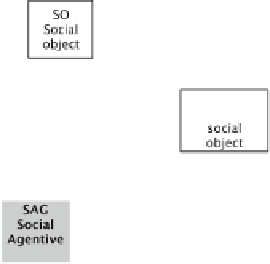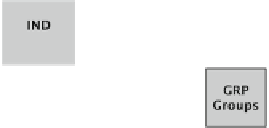Information Technology Reference
In-Depth Information
Table 2.1
Ontology of group agency in
DOLCE
ontological treatment of conflicts, by placing our treatment within the foundational
ontology
DOLCE
. The categories that we use are summarized in Table
2.1
at the
end of the paper, boldface categories are new wrt
DOLCE
. It is easy to define
individual attitudes
as propositional attitudes that are ascribed to an individual
agent
i
. We introduce a relation
ASC.a;i/
between propositional attitudes of a
certain type and individuals. In order to define ascription, we need a category
AT T.x/
for propositional attitudes and a category
IND.x/
for individual agents:
ASC.a;i/ !
AT T.a/ ^
IND.i/
. We shall also ascribe sets of attitudes
A
i
to individuals, we write
ASC.A
i
;i/
as a shorthand for
V
j
ASC.a
j
;i/
, for all
a
j
2 A
i
.
We are going to define the notion of
social propositional attitude
as a propo-
sitional attitude that is ascribed to the group of agents itself and not to any of
the individuals belonging to the group. Of course, it does not seem meaningful to
ascribe propositional attitudes to any set of individuals, or to any type of group.
For instance, if we talk about the beliefs of 15 individuals randomly chosen from
the phone book, we are simply talking about the sum of all individual beliefs, and
not about a single belief that is ascribed to the group itself. We need to be careful
when defining attitudes ascribed to groups since propositional attitudes are usually
properly intended as ascribed to
agents
. Thus, we would make a category mistake in
applying an attitude to something non-agentive, in the same way as we would make
a category mistake in attributing beliefs or intentions to a time interval.






























































Search WWH ::

Custom Search